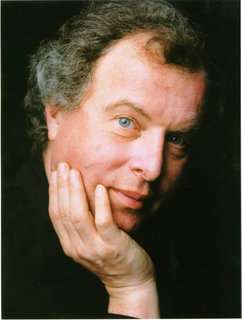|
Back
The God of Clarity Los Angeles
Walt Disney Concert Hall
10/22/2008 -
Ludwig van Beethoven: Sonatas No. 22 in F, Op. 54, No. 23 in F minor, Op. 57, "Appassionata", No. 24 in F-sharp, Op. 78, No. 25 in G, Op. 79, & No. 26 in E-flat, Op. 81a, "Les Adieux"
András Schiff (piano) 
A. Schiff (© Sheila Rock)
András Schiff began this complete cycle of Beethoven’s piano sonatas in 2004, to be performed at Disney Hall and Carnegie Hall, among other venues. Recorded live by ECM New Series, the project will be released in eight CD volumes through 2008. One particularly enlightening aspect of this series is that the sonatas are performed in their chronological order of composition. The program notes for these concerts consist of an in-depth set of interviews, with Schiff describing his approach to the interpretation of each of the sonatas. Part of the fascination of these performances is the pianist’s focus on the overall architecture of the sonatas as a series, as if each were a canto or stanza in a long epic poem. Each individual work is understood in the context of what comes before and after; and each performance is illuminated by its architectural position within the entire cycle.
Tonight’s performance included some of Beethoven’s greatest and best-loved works. With the “Appassionata” Sonata closing the first half of the recital, and the Sonata “Les Adieux” to conclude, this was certainly one of the most highly anticipated performances of the series. The first piece, Sonata No. 22, set the tone for the evening. From the moment he began playing, clarity was the watchword for his performance; it was absolutely crystalline. In Schiff’s hands, both movements of this sonata were supremely accessible and appealing. He offered a lyricism that was completely engaging, and was delightfully carried away by the second movement Allegretto. This opening piece intimated that any difficulty that Beethoven might impose would be sliced through like a Gordian knot, by Schiff’s extraordinary talent for clarity.
Within the first few bars of the “Appassionata”, it was clear that this performance would be one of the highlights of he musical season. Schiff’s writings and interviews on these performances demonstrate that his interpretation is intensely researched and studied, even if such writings are sometimes offered as misdirection. The result, in terms of the musicality of his performance, was an almost shockingly limpid clarity. Each finger on every note benefited unmistakably from an immense amount of intention. He achieved a dynamic range I had not encountered before. He hit the keys with more force and also more softly than anyone, but with exact control of that force. At an atomic level, he knew exactly what he wanted and executed his intention precisely. Both at the micro level of technique or process, and at the macro level of pre-meditation or architecture, this performance was supremely articulated.
My impression was that this extraordinary result grew out of his relentless study of the music itself, his desire to make the performance fresh and new, outside of tradition or history. It made me think of the “The New Criticism,” a mid-20th century movement in literary criticism that focused on the poem itself, ignoring history, biography, psychology and anything else outside of the text itself. This seemed to describe one aspect of Schiff’s approach- what does the music itself say to the performer, ignoring performance tradition and other exterior influences? This seemed to be one of the questions he was asking, but he included the architectonic influence of the surrounding sonatas and the cycle overall.
Another result was that the playing was not celebratory. He did not ride the emotions or the listener’s expectation of emotion. The approach was not spiritual or expressly lyrical. It was extremely studied but played with extreme passion, so that it felt like abandon, a kind of emotion but not what I might have expected. This was radically different from Lupu or Zimerman or Brendel or Ashkenazy or Pollini. I did not sense necessarily a greatness of soul, as this music can bring out in a pianist. There was plenty of speed but always proscribed, articulated, not intuitive but completely authentic, with nothing contrived. Every ounce of beauty was earned, through sustained effort and intellect. I suppose he should be compared to Brendel but it did not feel like Brendel at all. You’ve got to hear it.
The famous “Appassionata” Andante con moto was measured, but not by great wisdom or world-weariness as in Badura-Skoda. But with extreme intelligence and incisive inquisitiveness, as if he was constantly seeking, at a molecular level, to see precisely what the music offered. The Sonata No. 24 was gorgeous and upbeat, attractive. No. 25 was playful. The Adagio: Allegro “Les Adieux” of Sonata No. 26 was not marked by mystery, but with clarity in sadness, clarity rather than beauty of tone. The magnificent encore was a movement from Schumann in homage to Beethoven’s “Moonlight” Sonata.
Thomas Aujero Small
|